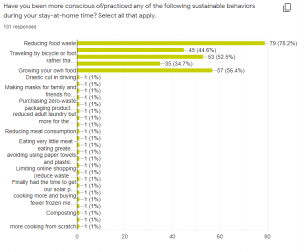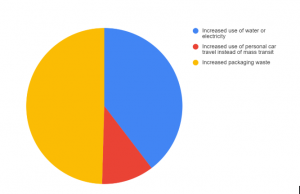Some of us may now be back to working in our library branches or buildings. Others may still be working from home, or dealing with challenges from furlough to job loss to providing full-time child care while working to pivoting to all-virtual programming. No matter our current circumstances, it feels important to reflect on the experiences, lessons, and changes wrought by our times under Stay-at-Home order, especially when it comes to sustainability in our day-to-day lives!
To this end, we’re so excited to share the responses to our SustainRT Outreach Committee “Sustainability During Stay-at-Home” Survey. More than 100 people responded, and it was a pleasure to receive these small glimpses into each other’s lives in a time when we can all feel really spread apart.
Below, find visual representations of responses to the surveys questions, as well as some selections from all the wonderful, individualized responses we received (some are excerpted from longer passages). Thanks to everybody who participated!
Question 1: Have you been more conscious of/practiced any of the following sustainable behaviors during your stay-at-home time? Select all that apply.

Question 2: Share some more about a sustainable practice that became part of your life during Stay-at-Home, whether big or small! Tell us how you got started, what inspired you, how easy or difficult this practice is, how you feel now that you’re doing it– whatever you’d like to share.
“About foraging…something I’d be wanting to learn more about. Listening to a lot of podcasts (esp. Susus Weed) and re-reading Stalking the Wild Asparagus, Eulle Gibbons. I got permission to pick stinging nettle from a university garden. Now I’m making uber nutritious soups, quiches, etc. Also violet leaves, garlic mustard, redbud flowers and soon linden leaves and flowers. Free, highly nutritive food all over the place! I feel grateful for the abundance of the Earth. I want to teach people about how to forage.”
“I started walking and then biking longer and longer distances. It honestly never occurred to me before. I always felt like I didn’t have enough time. In reality, biking takes about the same time as driving in many instances. But I didn’t have the mental space required to try it out until the lockdown.”
“Using a timer to limit shower time”
“I have been more conscious about providing amenities around my home to encourage biodiversity and support wildlife. I’ve created a “bird hotel” which is a series of bird feeders and hummingbird stations. I often make my own bird suet from leftover bacon grease and homemade sugar water for the hummingbirds. I also have planted many pollinator plants as part of my landscaping routine. Being at home allows me to observe the patterns of the birds more as well as provide better care for my plants….The care for the birds led to a desire to care for other species and the decision to focus on planting pollinator plants. It has been very easy to do this.”
Question 3: Are there any ways you’ve noticed Stay-at-Home/Covid-19 negatively affecting your ability to practice sustainable behaviors?

Further Comments:
“I feel badly about all the plastic bags from shopping, since reusable totes aren’t allowed in our state now. We’ll save and reuse, but it still seems counter to our efforts in the last few years.”
“I’m trying to work from home which is good, except that transit ridership is way down and I’m afraid this will lead to far more car driving once the stay at home order lifts.”
“Using more toilet paper!”
“Lots and lots of wipes”
“Increased emphasis on single-use materials to prevent contamination”
“I regularly get supplies at a bulk store. COVID-19 has meant that I can’t bring my own clean containers from home, so I’m ending up buying a lot more packaging.”
“Every meal at home meant running the dishwasher daily. It broke! The part can’t be replaced so the whole machine needs to be (and we’re washing less efficiently in the meantime.)”
“Increased packaging waste from take out for two reasons: 1) you can no longer bring your own containers to restaurants when ordered food to go, 2) I have ordered take out more often in order to support independent restaurants in the hopes they will make it through (previously I rarely ordered take out unless the restaurant allowed me to bring my own container). Another example: with the elimination of bulk bins and reusable bags, I cannot buy nuts, lentils, dried fruit, etc. from bulk bins using my own reusable produce bags. I am forced to buy pre-packaged items…I can still practice my sustainable behavior but with more effort and time (it is worth it).”


